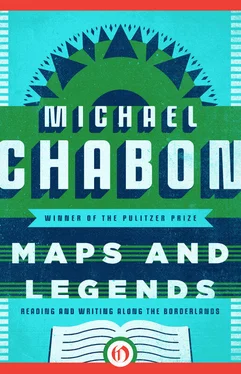* This line was written in the fall of 2000; I ought to have knocked wood.
1.
I WRITE FROM THE PLACE I live: in exile.
It’s no big deal; certainly it can’t compare to the exile endured by writers in literal flight from persecution, repression, intolerance, or war.
I write in a language of empire, the vital, burgeoning mother tongue of 350 million other people around the world. No regime or censor stands between me and the publication of my work — nothing but my own shortcomings and the invisible hand of the marketplace.
The circumstances of my life have always been comfortable, my freedoms guaranteed. I have never known anything resembling in the slightest the anti-Semitism that exiled my grandparents and great-grandparents, with no hope (and by 1945 no possibility) of return, from lands in which my ancestors had lived for a thousand years. If I want to return to the town where I grew up, all I need is a driver’s license, a car, and money for gas. I bear no marks or scars. I haven’t lost anything that isn’t lost by everyone.
And yet here I am — here I have always been, for as long as I can remember knowing anything about myself — feeling like a stranger.
For a long time now I’ve been busy, in my life and in my work, with a pair of ongoing, overarching investigations: into my heritage — rights and privileges, duties and burdens — as a Jew and as a teller of Jewish stories; and into my heritage as a lover of genre fiction. In all those years of lighting candles on Friday night and baking triangular cookies for Purim with my children and muddling through another doomed autumn trying to atone, years spent writing novels and stories about golems and the Jewish roots of American superhero comic books, Sherlock Holmes and the Holocaust, medieval Jewish freebooters, Passover Seders attended by protégés of forgotten Lovecraftian horror writers, years of writing essays, memoirs, and nervous manifestos about genre fiction or Jewishness — I failed to notice what now seems clear, namely that there was really only one investigation all along. One search, with a sole objective: a home, a world to call my own.
2.
I am an American, of course — what else? — but the America in which I feel at home is only a kind of planetarium show, sound and light, shifting images projected by an inner Zeiss against the cranial dome. Quartered in my head, a slick media organ produces and distributes to an audience of one an ongoing series of specials, features, potted histories, and theme-park rides that retail (panning slowly from left to right across still photographs or rocketing me along in my little tram car) an ongoing saga of violence, delusion, innovation, and struggle in which heroes, eccentrics, liars, bad men, victims, bloodthirsty prophets of God — the audioanimatronic ghosts of Charles Manson, Jesse James, Satchel Paige, Robert Oppenheimer, John Brown, Harry Houdini, Kurt Cobain, the girls of the Triangle Shirtwaist Factory — suffer without flagging their clockwork torments or propound their visions in THX sound. At times it’s a narrative as horrific as Blood Meridian, but like that novel one that is unable to rid itself, ultimately, of a final underlying tinge of romance.
Maybe everybody feels the sense of blinking disorientation I feel when I exit the turnstile of my own private Americaland and confront, say, the refrigerator hum, furtive faces, and doped-phosphor light of a 7-Eleven on a sketchy corner of Telegraph Avenue at midnight, walking through the door marked to gauge my approximate height in case I decide to hold the place up. I don’t know. Maybe that strangeness is a universal condition among Americans, if not in fact a prerequisite for citizenship. At any rate it is impossible to live intelligently as a member of a minority group in a nation that was founded every bit as firmly on enslavement and butchery as on ideals of liberty and brotherhood and not feel, at least every once in a while, that you can no more take for granted the continued tolerance of your existence here than you ought take the prosperity or freedom you enjoy. I guess every American Jew has a moment at which he or she feels the bottom drop out, and I would be willing to bet that for many of us it comes when we encounter some testimony to the pride, patriotism, and fierce sense of national identity — of being at home — felt by the majority of German Jews in the years running up to Nuremberg. For me that vertiginous moment came when I read, in W. G. Sebald’s The Emigrants, about a Jewish congregation in Augsburg that voluntarily stripped the copper roof from its synagogue and donated the metal to the German war effort during World War I. That act goes beyond any demonstration of wild, heartfelt patriotism I can imagine from even the most loyally American congregation of Jews.
Twenty years later, on Kristallnacht, the Augsburg synagogue was burned to its foundation.
3.
I fear that these reflections on home and belonging bring me inevitably to the question of Israel. Israel, or a place more or less coextensive with Israel as we know it, is supposed to be my home — spiritually and in physical fact. Around the time of the first Babylonian Exile the primordial engineers of Judaism began to wire a longing for Jerusalem, for the restoration of the Temple and the sovereignty of Jews over Israel, into the core circuitry of the religion. Certain venerable texts have long been interpreted as indicating not only that the land belongs to me by right but also that more than I want or am capable of wanting anything else in the world, I should want to live there. If I remain unpersuaded by these arguments, then there is the less venerable but better reasoned argument of Zionism, which even before the Holocaust lent its awful weight managed to persuade and finally convince generations of Jews, among them large numbers of my Litvak cousins, reputed to be among the most skeptical, hardheaded, and unsentimental people ever to look askance at the productions and dreams of their fellow humans. That argument, reduced to its essence, runs like this: history has proven that we will never be happy or safe, never be able to fulfill ourselves as a people, without a country of our own. It is a European argument, as Milan Kundera has observed, first made by Europeans, calculated and calibrated with nineteenth-century European logarithms of nation and homeland. It has nothing to do with the claims advanced by those old texts inked with pain and longing on the skins of sheep, but an appeal to legendary ancestry, to the legitimizing claims made by stories of blood and soil and kings, was a crucial part of the nineteenth-century nationalist package. Nonetheless in the early days of Zionism there were vocal factions agitating for any homeland at all, anywhere — Africa, Australia, any place where nobody would mind, or notice, or care. Such a place was as imaginary in its way as the Promised Land itself, and has in fact never since been located. In any case Uganda had no hold on the imagination of the Jews. Every year for a thousand years or more, we had ended our Passover seders with the promise or threat or rueful wish or bitter jest, “Next year in Jerusalem.” But under the pall of 1948 those words sounded, to the world, like a plan.
For millions of Jews living in the United States of America in 1948 and on every Passover thereafter, those four words proved troublesome, puzzling, even a source of embarrassment. What, I used to wonder when I was a kid, did they mean? Why did we say them? Were we, in fact, going to be in Jerusalem next year? We had said the same thing last year, as I recalled, and yet here we were again around my grandparents’ table in Silver Spring, Maryland, making this empty and peculiar boast. In fact we had no intention, as I eventually realized, of packing up and moving to Israel. We were happy where we were. We were like the family that buys a summerhouse amid jubilance and great expectations, but finds it too much trouble to decamp there every year when it’s so far and the weather is so fine at home. Or perhaps it would be more accurate to say that we thought of Israel as our fallout shelter, to be inhabited only in the event of terrible catastrophe.
Читать дальше
Конец ознакомительного отрывка
Купить книгу












